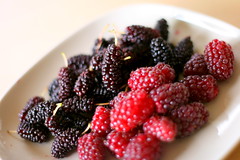One the most important components of skin health is vitamin A, and probably one of the best sources of it is low-fat dairy products. It could be said the health of our skin depends on vitamin A. Low-fat yogurt is not only high in vitamin A, but also acidophilus, the "live" bacteria that is good for intestinal health. Turns out, it may also have an impact on the skin, since it aids in digestion. Other good sources of vitamin A include cod liver oil, sweet potatoes, carrots, leafy vegetables, and fortified breakfast cereals.
 Image by mccun934 via FlickrIt’s important to also make sure you’re eating foods rich in antioxidants, such as blackberries, blueberries, strawberries, and plums. The benefits of these foods for healthy skin are plentiful. The antioxidants and other phytochemicals in these fruits can protect the skin cells, so there is less chance for damage. This in turn guards against premature aging, and keeps skin looking younger longer. Other fruits and vegetables that are high in antioxidants include artichokes, black, red, and pinto beans, prunes, and pecans.
Image by mccun934 via FlickrIt’s important to also make sure you’re eating foods rich in antioxidants, such as blackberries, blueberries, strawberries, and plums. The benefits of these foods for healthy skin are plentiful. The antioxidants and other phytochemicals in these fruits can protect the skin cells, so there is less chance for damage. This in turn guards against premature aging, and keeps skin looking younger longer. Other fruits and vegetables that are high in antioxidants include artichokes, black, red, and pinto beans, prunes, and pecans.Essential fatty acids (EFAs) are essential to your skin. Include salmon, walnuts, canola oil, and flax seed. EFAs keep cell membranes healthy, and allow nutrients to pass through.
We also need healthy oils, which contain more than essential fatty acids. Eating good-quality oils helps keep skin lubricated and keeps it looking and feeling healthier overall. Look for oils that are cold pressed, such as olive or extra virgin oil. We only need about two tablespoons a day of healthy oils, so use wisely.
 Image by Chiot's Run via FlickrSelenium plays an important role in the health of skin cells. Turn to foods like Whole-wheat bread, muffins, and cereals; turkey, tuna and brazil nuts for this important nutrient. Recent studies show that if selenium levels are high, even skin damaged by the sun may only suffer minimal, if any, damage.
Image by Chiot's Run via FlickrSelenium plays an important role in the health of skin cells. Turn to foods like Whole-wheat bread, muffins, and cereals; turkey, tuna and brazil nuts for this important nutrient. Recent studies show that if selenium levels are high, even skin damaged by the sun may only suffer minimal, if any, damage.Choosing the whole grain versions of complex carbohydrates can have a significant effect on insulin levels. Processed and refined sugars can cause inflammation that may ultimately be linked to skin break outs.
Green tea has anti-inflammatory properties, and it protects the membrane of the cell. It may even help prevent or reduce skin cancer risks.
Water plays such an important role in your overall health, and it has a profound effect on your skin’s health as well. Well-hydrated skin is healthy and young-looking. It also helps move the toxins out of your system so they have less chance to do damage.

No comments:
Post a Comment